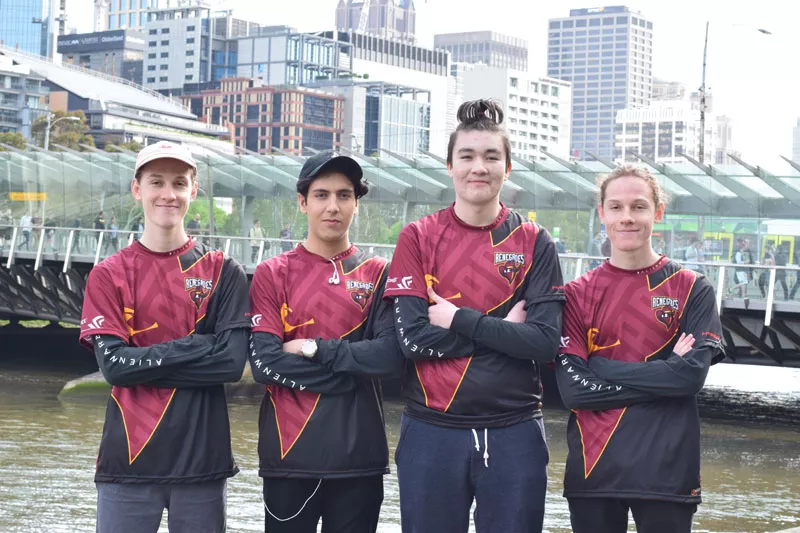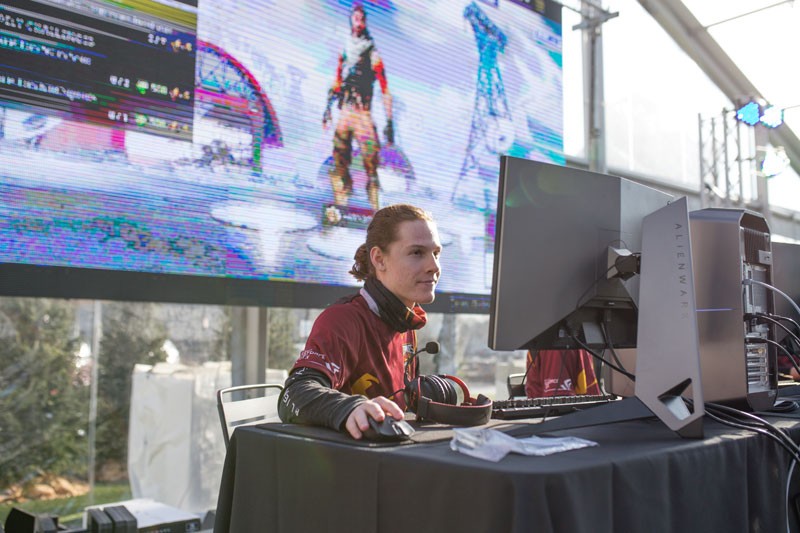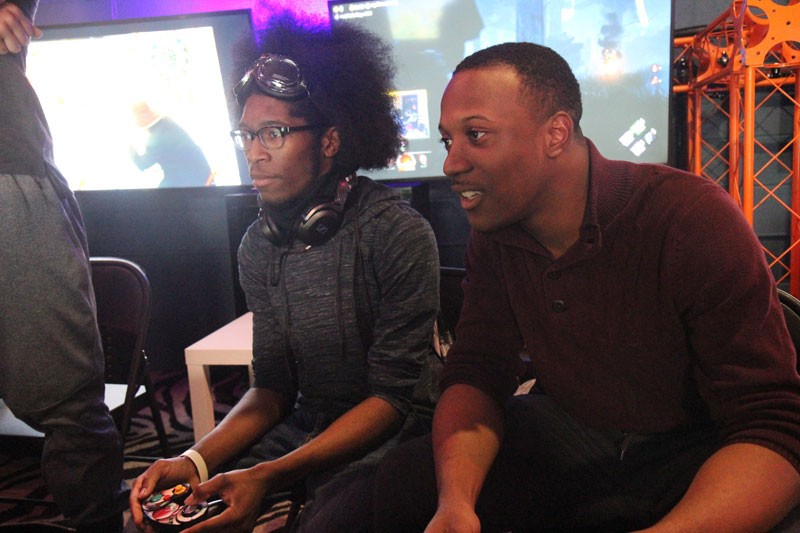The Detroit Renegades are best known by the names on the back of their team jerseys: Hershicals, MrFreshAsian, and the two X2Twins. The four lanky, teenage athletes awkwardly find their spots on stage as laser lights zigzag over their heads from atop the screen. Meanwhile, DJ Invisible hypes an audience of hundreds of pre-pubescent spectators with the high-energy beats from the sports arena staple "Get Ready For This." The audience is dotted with red, black, and gold, the colors of the Renegades, and attendees mimic the Fortnite-inspired dances that have come to dominate in the world of pre-teen social media.
This isn't a high school homecoming. This is "eSports," the burgeoning world of professional video gaming. And it's coming to Detroit.
What began as a curiosity in tech hubs around the world has exploded across the map in recent years. Last year, the NBA brought professional virtual basketball teams to 17 cities across the country. ESPN penned a deal to bring the Overwatch eSports League to live cable Television for the first time, and Nike even included Chinese League of Legends player Jian Zihao, 21, as the brand's first eSports athlete to participate in one of its marketing campaigns. The newly constructed eSports Arena Oakland in California and the HyperX Esports Arena Las Vegas host competitions that attract tens of thousands of fans, with hundreds of thousands tuning in online.
And now, it's happening in Detroit, where an unlikely alliance that spans the private and public sectors — from the grassroots of the city to coastal investors — is aligning to put a Motor City eSports scene on the map.
Detroit might not be at the level of L.A., but the eSports community is growing. There was the $10,000-prize Motor City Madness eSports basketball championship held in Little Caesars Arena last year. The first nationally syndicated eSports radio show, Checkpoint XP, was founded by four Detroiters in Ferndale. A successful game developer opened "Detroit's premier eSports venue," High Score, to create an eSports watering hole for the community. There is also NBA player Jonas Jerebko, who bought a Los Angeles-based eSports team, the Renegades, and moved them to Detroit. There was perhaps no singular moment when the eSports phenomenon reached our corner of Michigan, but it's undeniably here now.
Believe it or not, the world of professional video gaming is a big business. According to market research firm Newzoo, eSports generated $900 million in revenue last year, and by 2021, that figure is expected to exceed $1.5 billion. With figures like that, it's no wonder city officials and partners see a market potential and are rallying with the community to get Detroit talking about eSports.
eSports generated $900 million in revenue last year, and by 2021, that figure is expected to exceed $1.5 billion.
tweet this
As part of this campaign, the nonprofit Detroit Downtown Partnership collaborated with the Detroit Renegades to host a free expo for the public in downtown's Beacon Park in December. Hundreds of fans showed up to watch the Renegades' four-man (well, in one case, boy) Fortnite team show off their talent on a massive screen in a heated tent in the middle of the park.
"There are so many kids who want to sit down and watch an organized eSports tournament, that want to root and cheer for someone in that," says Nate Bender, host of Checkpoint XP. "The numbers just keep growing. There is a willing and wanting audience that's there, asking to be engaged."
At the Detroit expo, Bender strained to be heard over the blare of virtual gunfire emanating from the Fortnite battle being waged on the giant screen behind him. Hundreds of attendees laughed and shouted, doing "the wave" at one point, like any other sporting event. Some shouted out tips to the four gamers on stage, while others headed to the food trucks outside the makeshift sports stadium. Plenty looked on in seeming awe at the talent on display.
Some might dismiss video games as a childish obsession, or scoff at the idea of pushing buttons on a controller as being anything like a traditional athletic sport, but consider this — the excitement around the Renegades is palpable. In between matches, the players joke on stage with each other, but once the gaming begins an intensity washes over their faces. Fans stand at attention, enthusiastically cheering the team and reacting to the team's decisions just as, say, Lions fans do during a game. Fans later jump at the chance to take photos with the team, one man even bringing his two labradoodles into the photo. As the Renegades sat for autographs, fans rushed to get their custom controllers signed just as baseball fans do with leather gloves.
Detroit is already a sports town, with major professional baseball, hockey, basketball, and football franchises in the city, as well as the growing grassroots soccer team Detroit City Football Club in Hamtramck. Given that, it's not surprising that eSports would be poised to take hold here as well.
"There's a huge opportunity for a city in the Midwest to really stake its claim in eSports, and I hope it's going to be Detroit," Bender says as fans rush to get in line for a photo with the Renegades, who are dressed in the team's official jersey, branded with logos of big-name gaming sponsors like Nvidia and HyperX. "Having a team that is based in Detroit is huge for the tribalism and building up of the local scene."
The Renegades organization was previously rooted in Los Angeles, the heart of the North American eSports scene, until they were purchased in 2016 by NBA power forward Jonas Jerebko. Originally from Sweden and now playing for the Golden State Warriors, Jerebko began as a rookie for the Pistons and developed a cult following in Detroit. Perhaps it was his passion for the city, but more likely it was the relatively cheap operating costs that motivated him to move operations to Southeast Michigan and rebrand as the Detroit Renegades.
After a few years of experimentation with teams in varying games, from Super Smash Bros. to modern shooters like Call of Duty, the Renegades now boast 16 salaried gamers who compete on four squads in some of the largest tournaments around the world. Half of the team's players as well as a team coach live and train alongside one another in two houses just outside Detroit in suburban Rochester. The rest of the team's players are spread around the world, competing remotely from home over the internet.
The Renegades' Fortnite team, for example, may be little known in Detroit, but they are a dominating force in their homeland of Australia. There, they were brought under the tutelage of the Renegades organization in August, through the acquisition of the Australian team formerly known as "Twinsanity" founded by the X2Twins, Jesse and Jordan Eckley, 18, both now on the Renegades.
The two came into professional gaming young. "It was pretty late on in high school when we realized [we could do] gaming for a living," Jordan says. "It seems like a lot of people are jumping onto it now."
That's a bit of an understatement. Fortnite caused waves in the gaming world all through 2018, reporting 78.3 million users in August, its busiest month yet. A free battle royale-style game that pits 100 online players in a fight to the death on a post-apocalyptic island, Fortnite was instantly hailed as a gaming success, merging resource collection, structure building, and shooting into one game. In terms of revenue, Fortnite generates more than $1 million every day, according to a market report by analytics firm Sensor Tower.
At the height of the Fortnite boom, the X2Twins were leaving a mark on the Australian gaming scene. Then they met Harley Campbell, aka MrFreshAsian, who was winning over a huge Fortnite following by live-streaming his performances on Twitch, a video streaming platform mainly for gamers that was recently purchased by Amazon for just under $1 billion.
In tandem to the eSports phenomenon is the live-streaming phenomenon, driving by the platform Twitch. There, streamers upload live feeds of their gaming performances for an online audience, offering commentary on the game. It is here where gamers become celebrities in their own right, where success is often tied to the players' personalities and ability to engage viewers. eSports competitors, on the other hand, compete in organized competitions for cash prizes. Their success is entirely dependent on their ability to defeat opponents.
While many eSports athletes stream their training sessions to grow their fan base, celebrity streamers are typically seen as less-skilled. But some, such as 16-year-old wunderkind Campbell, have nonetheless found success in both fields. With the fourth-fastest growing Twitch audience in the world, Campbell caught the attention of the X2Twins early last year. Soon after, Campbell dropped out of high school and now he says he's making more money through Fortnite than he thought possible.
"I never really did well in school. I was too into games," Campbell says. "I was always going to drop out. I was going to get an electrical trade, but then Fortnite blew up and I saw an opportunity."
Campbell is a rare case of success, he admits, and encourages everyone to graduate high school, but also says he doesn't regret the decision. As a full-time professional gamer, he may already be living the dream of teenagers the world over, but he's not slowing down. He says he has his sights set on making it to the U.S., where he says the best players are.
"I've 100 percent invested in this," he says. "I can't slack. I can't burnout and stop doing it. I've got to grind it out and make it to America."
Even if it was just for a weekend, Campbell and the rest of his team say the eSports community here intrigued them.
"Detroit is a pretty community-driven place. It 100 percent has the potential to bring in eSports," says Hersh Notani, 18, the fourth member of the Renegades Fortnite team. "Start off small, make it more accessible, focus on the community, and eventually it'll grow. Then the bigger monthly or bi-annual tournaments will bring in those massive crowds of thousands or hundreds of thousands."

It might be tough to imagine Detroit drawing in the kinds of crowds Notani describes, but the city's well-known venues have a proven record of hosting small to mid-tier eSports tournaments. Since 2014, the Michigan-based company MES Events has brought nationally significant eSports tournaments to Detroit and the surrounding suburbs. Last year, MES brought more than 100 Call of Duty teams to Farmington Hills in competition for $5,000, a prize that's dwarfed by those offered at major international events packing arenas like the Barclays Center, Madison Square Garden, and Beijing's Olympic Stadium.
On the weekend of Feb. 16, MES will bring a weekend of eSports to the MotorCity Casino Hotel where teams are set to compete for $10,000 in a variety of games. Just a few months ago, the Cobo Center, best known for hosting the North American International Auto Show, turned its sights on eSports and welcomed nearly 2,500 competitors for the 8th annual Big House Super Smash Bros. tournament.
"Southeast Michigan appears to be a hotbed for eSports events, and I think the appeal for these events is strong in this market," Claude Molinari, general manager of Cobo Center, says in a statement to the Metro Times. "We are particularly interested in eSports events and trade shows with augmented reality or virtual reality exhibits, expecting them to be a wave of the future."
Cobo Center isn't the only Detroit institution that sees potential in the eSports market. When the Motor City Madness eSports event drew more than 10,000 fans of the basketball game NBA 2k18 to Little Caesars Arena last year, the Detroit Sports Commission pitched in to double the prize pool to $10,000.
"It is an amazing sport. To see the number of individuals participating, to understand the pace of growth is just something else," says Kris Smith, director of the Detroit Sports Commission. "So little is known about eSports right now. We can better position Detroit as a destination for eSports events."
Some might dismiss video games as a childish obsession, but consider this — the excitement around the Renegades is palpable.
tweet this
Beyond the flashy venues downtown, however, some Michigan businesses are already betting big on eSports. There is perhaps no establishment more central to the current eSports scene in Michigan than High Score eSports, a man cave-like brick-and-mortar in Ferndale. The venue hosts private events as well as regular weekly and monthly tournaments that attract a crowd of anywhere from a few dozen to more than a hundred.
"We see this as kind of an incubator for testing and experimenting with new ways to develop the eSports community," says High Score founder Nathaniel McClure. "Before, you played video games alone in your house. Now, gamers want a social environment. They were looking for the human connection traditionally missing from games."
McClure is something of an expert on gaming, devoting most of his life to the industry. McClure landed a gig out of college at game production titan Activision, where he molded childhoods through his work on games like Call of Duty and Star Wars Jedi Knight 2. But the hours were long and McClure felt that his creative vision was stifled by the corporate world of video game production, which is dominated by a handful of powerful firms, so he left to found his own production studio, Epicenter. Soon after, in 2008, Michigan passed the Film and Entertainment Incentive Act to attract the economic benefits of the entertainment industry to alleviate the state's financial woes. The governor's office "rolled out the red carpet," according to McClure, so he and half his team saddled up for metro Detroit, and filled his staff with computer science graduates from surrounding universities.
"My wife said I'm fucking nuts, but it gave us a significant advantage over our competition," McClure says. "Operations are cheaper, living is cheaper, there are good schools, and really, all you need to build a game is four walls and a screen."
But McClure's Michigan experiment in game production didn't last long. When he applied for the tax incentives, he was denied. After a string of what McClure calls broken promises and a four-year legal battle with Michigan's Treasury Department, he barely broke even on his investment in the studio. But his experience in Michigan showed him that there was demand for a social gamer experience, and he believed that the right business could tap into the market.
"We're really the first ones we know of doing this," he tells us from inside High Score on a recent Thursday night before the weekly Super Smash Bros. tournament. "We see this as kind of an incubator for testing and experimenting with new ways to develop the eSports community."
Inside High Score, big-screen TVs line the walls and fold-out tables fitted with computer monitors and metal chairs fill most of the space. This is where competitors play friendly matches and compete in a bracket. The night we stopped by, a diverse, multi-ethnic crowd from both the city and suburbs was well represented. (That said, it should be noted there was not a single woman in attendance, though not from lack of effort, some attendees insisted.) While a few were fully absorbed by the competition, others came armed with six-packs — High Score encourages guests to BYOB — and chatted up the competition.
"We're a pretty close-knit bunch. I know 99 percent of the guys here," says one attendee, Donald Smith, 23, who was born and raised in Detroit. "We hang out all the time and tonight we'll probably go for drinks after the tournament."
The tournament progresses well into the night. It's nearly midnight by the time we reach the finals, but even those already knocked out stick around. Those left in the tournament compete in the streaming station, a sectioned-off corner of High Score equipped with professional gaming chairs, two commentators, studio lights, and three cameras on tripods. The entire tournament is live-streamed on Twitch by Dakota Minda, 26, who supplies the equipment and makes sure the stream runs smoothly throughout the night. Between helping set up streams for others like High Score and his own personal streaming account with a relatively large following, Minda has managed to make this a full-time job.
"I've been streaming since before Twitch was a thing," he says, adding that he is recognized by Twitch as an official partner, which he says is akin to Twitter's blue "verified" checkmark. "I don't drive a Mercedes, actually I just bought a van to carry all the gear, but it's a nice comfortable living. It's worth it to be a part of grassroots eSports."
After Nintendo released the latest version of Super Smash Bros. last month, attendance at High Score's weekly tournaments ballooned. To accommodate the uptick in turnout, McClure now brings his legion of gamers to Farmington Hill's Buffalo Wild Wings, where they pack the place every Thursday night.
But High Score has their eyes set on horizons further than Ferndale. McClure says he's preparing for a 2019 expansion of High Score to nine more locations throughout the state. He says the expansion will support the establishment of a scholastic eSports organization by the Michigan High School Athletic Association.
A number of universities throughout the state, such as the University of Michigan and Western Michigan University, have already established eSports teams for their schools, and some have gone so far as to offer scholarship funding for eSports players. Western recently put half a million dollars toward flipping a lecture hall into a "video game facility." According to Andy Frushour, director of brand management for the MHSAA, eSports is even likely to become a varsity sport at a number of high schools in Michigan by the start of the next academic year.
"Taking away the physical nature of sports, [eSports and traditional sports] actually look pretty similar," Frushour says. "There's leadership, communication, competition, practice, hand-eye coordination. The things you can learn being on a team, you can learn being on an eSports team."
As one might expect, some parents and athletic directors oppose the endorsement of eSports as a high school sport in Michigan. Some believe video games are not an activity that schools should encourage, Furshour says, and others are uncomfortable with the level of violence in some popular eSports games.
It will take experimentation to establish an effective high school eSports program, Frushour says, but the MHSAA is not shying away from the challenge.
"We can reach kids who are at home playing these games alone right now," he says. "We can bring them into school, in a social environment where they can play together."
Stay on top of Detroit news and views. Sign up for our weekly issue newsletter delivered each Wednesday.








